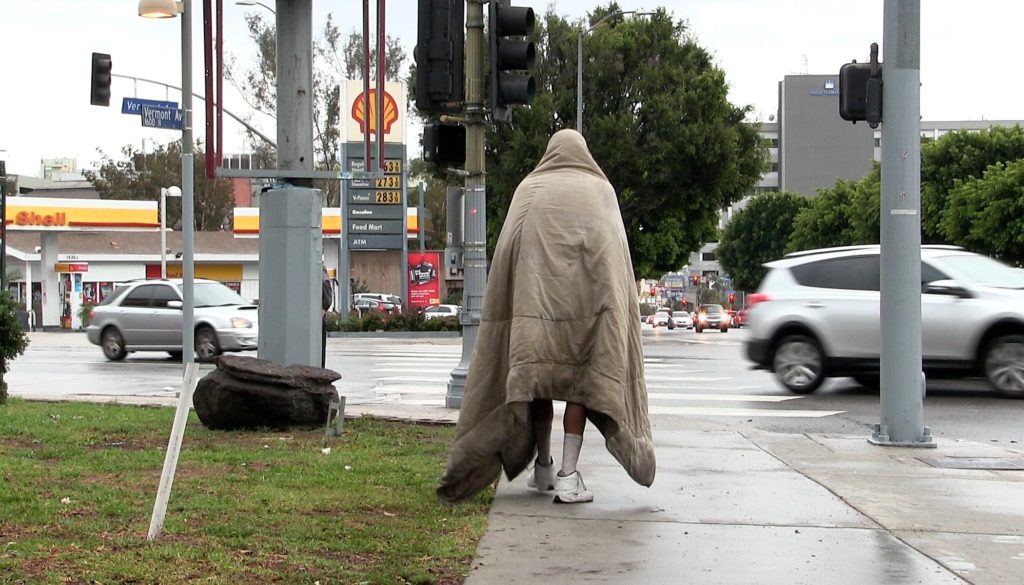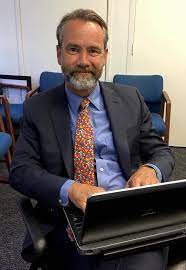
Should the mentally ill be allowed to stay on the streets?
“Ending the ‘Off & On’ Street Cycle of Severely Mentally Ill People,” was the talk given by Dr. Jonathan Sherin, director of the County Department of Mental Health, to the Pacific Palisades Task Force on Homelessness on May 24.
Sherin told those who attended virtually, “This is a monster topic, we have a humanitarian crisis on our hands.”
He said that the mentally ill can best be helped with 1) treatment; 2) housing; 3) work; and 4) a connection with the community, but “the system is inadequate in Los Angeles.”
Right now, according to Sherin, any true help for these people has been replaced by “open-air asylums” (streets) and “closed-air asylums” (jail).
“We are about 4,000 treatment beds short in Los Angeles,” he said, noting that L.A. County has been pushing for an exclusion to IMD-Index of Multiple Deprivation. (The IMD exclusion is a discriminatory federal rule that prohibits federal Medicaid reimbursement to states for adult patients receiving mental health or substance abuse care in a psychiatric or substance abuse treatment facility with more than 16 beds.)
“In my opinion, we’re reaching an inflection point,” Sherin said. “It’s not just about the individual, it’s about the collective public safety and it’s a public health emergency.”
He explained that the term “gravely disabled,” which is defined as “a person is presently unable to provide for the person’s basic needs for food, clothing, or shelter,” needs to be expanded.
The term “is silent on public safety and on neglecting oneself,” he said. Many of these people will say they are doing fine, even as they are dying on the street because of Anosognosia, which means that a person is unaware of their own mental health condition and can’t perceive their illness accurately.

Dr. Jonathan Sherin
Sherin spoke about engaging the individual — “resources first” — and then to continue to engage that individual. The only other tools are a 50-51 day hold, a 30-day hold and a 14-day hold.
“We have to replace LPS [the Lanterman-Petris-Short Act],” Sherin said. “The climate is right.” (In 1967, after Ronald Reagan was elected governor, he signed the LPS Act, which meant that patients could not be institutionalized against their will or for indefinite periods of time.)
“We have people languishing in the streets, people are dying, not only from overdoses, but also from traffic accidents—people are walking into the streets,” Sherin said.
He suggested that perhaps the Army Corps of Engineers could set up a base on City, State or Federal property—to take people off the street. “Can we do something to break the log jam?” he asked. “We need to give people the chance to live full lives.”
He said that there are no easy solutions and that “we’re decades of being negligent,” and unless something is changed, at the current rate, “it could take decades to fix.”
Sherin said it could be valuable to find out who’s out there, and then to address the needs of those people. “We have to look after one another,” he said. “Our elected officials have to be part of the solution.”
He and State Senator Henry Stern wrote a December 2020 op-ed in the L.A.Times (“Our Mental Health Laws Are Failing”) that “looks for more humane ways of working with the mentally ill.
. . . . “Today, the law allows for people presenting acute emergencies to be involuntarily hospitalized for short-term holds. But brief hospital stays rarely lead to a future in which people suffering can recover and live safely in communities. In fact, repeated short-term hospitalizations can be traumatic. But the bar on longer term, mandatory treatment is set arbitrarily high.
“If a person can articulate plans for providing for their food, clothing and shelter, even if that means getting donated food and clothes and sleeping in a tent on the street, that is enough to keep them from being considered ‘gravely disabled’ in many courts under current state law.
. . . “Meanwhile, neighborhoods are left to deal with the fallout from our policy failures. In many areas of Los Angeles, families are understandably afraid to take their children to supermarkets or playgrounds, or to walk under local freeways. Not surprisingly, these concerns are festering into outright animosity toward the unhoused and toward local governments.”
Sherin’s entire presentation is on the pptfh.org website.

Members of the Task Force on Homelessness tried to get Timmy off the streets. He resisted the PPTFH efforts and died on the streets.
HISTORY OF HELPING THE MENTALLY ILL:
Many Pacific Palisades residents blame Ronald Reagan for the current number of homeless mentally ill on the streets. The current situation actually started with President John F. Kennedy.
Here’s a quick timeline:
Asylums were created in the 1810s-1820s because insanity was seen as a medical problem. Until the 1950s, people with mental issues were taken mostly to larger institutions.
In California, state hospitals provided care for all who needed it regardless of ability to pay and provided a wide variety of therapeutic activities, ranging from occupational and industrial therapy to beauty shop therapy and bibliotherapy.
In October 1963, President Kennedy signed a bill that was meant to free thousands of individuals from life in institutions, by building 1,500 outpatient mental health centers to offer community-based care. Tragically, he was assassinated and the outpatient facilities were not built.
In 1965, Medicaid and Medicare laws were passed. Disabled people living in the community were eligible for benefits, but those in mental hospitals were excluded.
In 1967, when Reagan was elected governor, the number of patients in state hospitals was about 22,000. He made cuts to the Department of Mental Hygiene and signed the Lanterman-Petris-Short Act, which meant that patients could not be institutionalized against their will or for indefinite periods of time. According to an NPR report, after the law was enacted, the number of people entering San Mateo’s criminal justice system doubled.
In 1969, Reagan reversed his position and increased the allocation for the Department of Mental Hygiene by $28 million.
In 1972, Social Security was modified so that payments could be made to individuals not living in a hospital, in order to encourage people to live independently. Medicare provided funds for the elderly to be treated in nursing homes rather than hospitals.
Medicaid also was designed to encourage states to move people out of hospitals and into smaller facilities. States could only be reimbursed for expenses if individuals were living in a facility with 16 or fewer beds.
According to Dr. Richard Frank, writing in the Journal of Psychiatric Services, the number of state mental hospital residents over the age of 65 fell from 153,309 in 1962 to 78,479 ten years later.
During that time the number of elderly people with mental disorders residing in nursing homes grew from 187,675 to 367,586.
In 1980, President Jimmy Carter signed the Mental Health Systems Act to provide federal funding to states for the mentally ill.
As president, Reagan repealed this act in 1981, pushing the financial responsibility of the mentally ill back to the states.
According to NPR, in 2004 the U.S. Department of Justice estimated that 10 percent of state prisoners had symptoms that met criteria for psychotic disorder.
In the 2015 homeless count in San Francisco, it was reported that 55 percent of people experiencing chronic homelessness report they have emotional or psychiatric conditions.
California voters passed the Mental Health Service Act (Proposition 63) in November 2004, and it has generated about $15 billion from those taxpayers who have personal income in excess of $1 million, but the act has become saddled with so many restrictions that the money is devoted to outpatients, not for voluntary care.
“The passage of time since MHSA funding was approved has demonstrated that it has not been effectively directed to those inpatient services that would most benefit people gravely disabled by mental illness, especially those struggling in the streets,” Dr. Roderick Shaner, former medical director of the County Department of Mental Health, wrote in a January 30 email to Circling the News.
“AB 1938 (Eggman) would clarify that the language of the Mental Health Services Act indeed permits the funding of inpatient mental health services, including services for people detained involuntarily due to Grave Disability under California Law,” Shaner said. “Improved funding for inpatient care is critically important to address the immediate needs of people most in need of mental health care.”
